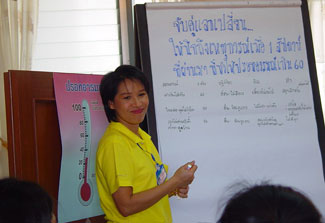Research aims to curb mental, emotional pain of HIV
January / February 2015 | Volume 14, Issue 1
by Cathy Kristiansen
The emotional, mental and social consequences of HIV/AIDS are often left untreated in developing countries, where resources are scarce. So, for instance, women experiencing stigma may withdraw from daily chores, children grieving for a parent or sibling can flounder in school, while caregivers may become overwhelmed and fall into depression.

Photo courtesy of Dr. Sung-Jae Lee
An intervention in Thailand reduced the emotional and
mental toll of HIV/AIDS.
The NIH's
National Institute of Nursing Research (NINR) has supported a number of global health studies on these aspects of HIV/AIDS, with researchers assessing the burden and testing low-cost interventions to relieve suffering. These studies also build local capacity by training nurses and health care workers to conduct research and apply findings to improve care. Scientific discoveries made in one country can often be adapted for use elsewhere, guiding worldwide strategies to improve health.
In Thailand, where the UN estimates half a million people are living with HIV/AIDS, NINR has collaborated with the National Institute of Mental Health (NIMH) to fund studies on reducing depression and improving quality of life among people with the virus and their family members. Research has shown this is important not only to lessen misery but also curb another problem in Thailand: concealing an HIV diagnosis, which in turn adds psychological stress, reduces treatment adherence and promotes spread of the disease.
Scientists devised a 13-week program based on Thailand's culture of close-knit families, which teaches coping skills to caregivers and children, and fosters connections with others facing the same issues. Sessions focus on how to mitigate negative emotions linked to HIV/AIDS by, for instance, projecting feeling intensity onto a thermometer illustration, practicing relaxation techniques and, in group sessions, airing negative experiences and discussing possible approaches to manage them. Participants also used role-play to practice revealing an HIV-positive status to relatives and work colleagues.
The team tested the curriculum with 813 participants and then gauged their emotional health for another two years. The intervention worked best for those with low or no depressive symptoms, the study showed. Based on its overall success, other hospitals in Thailand have begun adopting the program.
"This study makes a contribution to the current field of family interventions in demonstrating not only the feasibility, but also the efficacy of such a model that has the potential to be adapted to different cultures with a family-oriented tradition," said co-investigator, Dr. Sung-Jae Lee, of the University of California, Los Angeles (UCLA).
For more than a decade, NINR has been funding similar research in China. Many projects have focused on children, who can suffer deeply when a family member has HIV. Research on early childhood development has shown that if children in adverse environments build resistance, they fare better then and later in life.
In one NINR-funded study, researchers developed a program that combined peer-group activities, skills training and community advocacy. For instance, a turtle puppet, stickers and feelings chart were used to help children control aggression. Meanwhile, adults had lessons on positive parenting skills and received individual counseling. Dr. Xiaoming Li, of Wayne State University, and his colleagues are now assessing the intervention's impact.
In another study, Li's team investigated how orphans fare in different types of care environments. Using a trauma symptom checklist, the researchers measured anxiety, depression, anger, post-traumatic stress, dissociation and sexual concerns in orphaned children in rural locations. The results showed community-based group homes had better outcomes than those in AIDS orphanages and especially those in kinship care. Small homes permitted a closer child-caregiver relationship, higher quality of caregiving and less stigmatization. The findings could help inform government programs, the researchers suggest.
Other NINR global studies in this realm of health include a psychosocial intervention targeting Zimbabwean teens with an HIV-positive family member, as well as a project to improve the mental and physical health of women living with HIV/AIDS in rural India.
By funding global health studies that examine the ripple effects of HIV/AIDS on mental, social and emotional health, NINR and other NIH agencies are helping improve the quality of life for people living with or affected by the far-reaching disease.
More Information
- Learn more about the
National Institute of Nursing Research (NINR).
- Learn more about the related NINR-supported projects:
- Related resources and publications:
-
Family to Family Intervention Manual (designed for use in Thailand)
UCLA Center for HIV Identification, Prevention and Treatment Services (CHIPTS) - Chi P et al.
Vicious Circle of perceived stigma, enacted stigma and depressive symptoms among children affected by HIV/AIDS in China.
AIDS and behavior, June 2014
- Chi P et al.
Do children orphaned by AIDS experience distress over time? A latent growth curve analysis of depressive symptoms.
Psychology, health and medicine, April 2014
- Lee SJ et al.
Disclosure challenges among people living with HIV in Thailand.
International journal of nursing practice, August 2013
- Li L et al.
Efficacy of an intervention for families living with HIV in Thailand: a randomized controlled trial.
AIDS and Behavior, July 2012
- Hong Y et al.
Care arrangements of AIDS orphans and their relationship with children’s psychological well-being in rural China.
Health policy and planning, March 2011
- Li L et al.
Stigma, social support, and depression among people living with HIV in Thailand.
AIDS Care, August 2009
To view Adobe PDF files,
download current, free accessible plug-ins from Adobe's website.